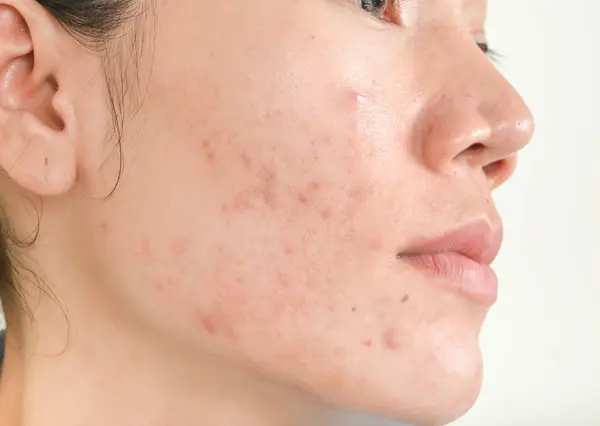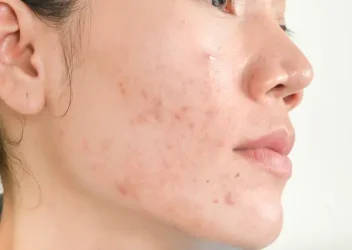What causes acne scars?
Acne scars are caused by the body’s natural healing process after severe acne breakouts. When the skin experiences a severe acne breakout, the body responds by producing more collagen to heal and protect the damaged skin. The excess collagen can create raised or depressed scar tissue, resulting in scarring. Additionally, picking or popping pimples can cause further damage to the skin and increase the risk of scarring. The severity and type of acne breakout also contribute to the formation of scars.
How do I tell an acne scar from other skin conditions?
Acne scars are typically indented or depressed areas on the skin that remain after the acne has healed. They may appear as small pits or larger craters, and can be pink, red, or brown in colour. Other skin conditions, such as freckles, age spots, or sun damage, do not have the same texture or shape as acne scars.
What are the different skin types and how do they affect acne scars?
There are five different skin types:
a. Normal skin – This type of skin has a balanced pH level and is neither too oily nor too dry.
b. Oily skin – People with oily skin tend to have larger pores, which secrete more oil. This can lead to clogged pores and acne breakouts.
c. Dry skin – This type of skin lacks natural oils and can feel tight and rough. It is prone to flaking and itching.
d. Combination skin – This skin type can have areas that are oily, such as the T-zone (forehead, nose, and chin), and areas that are dry, such as the cheeks.
e. Sensitive skin – This type of skin is easily irritated by external factors such as weather, skincare products, and even stress.
Acne scars can be affected by different skin types in different ways. For example, people with oily skin may be more prone to developing acne breakouts, which can lead to scarring. Those with dry skin may have difficulty healing acne scars because their skin lacks natural oils that help promote skin regeneration. Combination skin can also be prone to acne breakouts, while sensitive skin may be more susceptible to scarring due to inflammation caused by acne breakouts. Ultimately, the severity and nature of acne scars depend on the individual’s skin type, the type of acne they have, and how they care for their skin.
Are there different types of acne scars and do they matter?
Yes, there are different types of acne scars, and they do matter because they require different treatments. Some common types of acne scars include:
Atrophic scars: These are depressions or indentations in the skin, usually caused by loss of collagen. They can be further classified as ice-pick, boxcar, or rolling scars depending on their shape and size.
Hypertrophic or keloid scars: These are raised scars that occur when the body produces too much collagen during the healing process.
Post-inflammatory hyperpigmentation (PIH): This is not a true scar but rather a discoloration of the skin that occurs after inflammation or injury. PIH can last for several months or even years.
Each type of acne scar requires a different approach for treatment, which may include topical creams, laser resurfacing, dermal fillers, or other procedures.
Do acne scars become less noticeable over time?
Yes, acne scars may become less noticeable over time as the skin naturally repairs itself. However, the extent of improvement depends on the severity of scarring and the individual’s skin type. In some cases, professional treatments such as chemical peels, microdermabrasion, or laser resurfacing may be necessary for significant improvement.
How soon should you see a doctor after discovering an acne scar?
If you discover an acne scar, it’s best to consult with our doctor as soon as possible. We can help determine the type of scarring and recommend appropriate treatments or procedures to reduce the appearance of scarring. The earlier you seek treatment, the higher the chance of success in minimizing the scar’s visibility.
Are treatments to get rid of acne scars always invasive?
No, treatments to get rid of acne scars are not always invasive. There are various non-invasive and minimally invasive treatments available, such as chemical peels, microdermabrasion, laser resurfacing, microneedling, and dermal fillers. The type of treatment recommended depends on the severity of the scars and the individual’s skin type and condition.
Even after treatment, are some remaining marks to be expected? (i.e. red marks left by acne spots)
It is common to experience some residual marks or discoloration despite acne or acne scar treatment, depending on the severity of the scars and the effectiveness of the treatment. This can include red or brown marks left by acne spots, which may take some time to fade. It is important to follow the doctor’s instructions for post-treatment care and discuss any concerns or issues you may have. Doctor may be able to recommend additional treatments or skincare products to help minimize the appearance of any lingering marks.
What is the downtime for acne scar removal treatments?
Some treatments may have no downtime at all, while others may require a few days to a week for redness, swelling, and mild discomfort to subside. It is best to consult our doctor to discuss the specific downtime for each treatment option.






